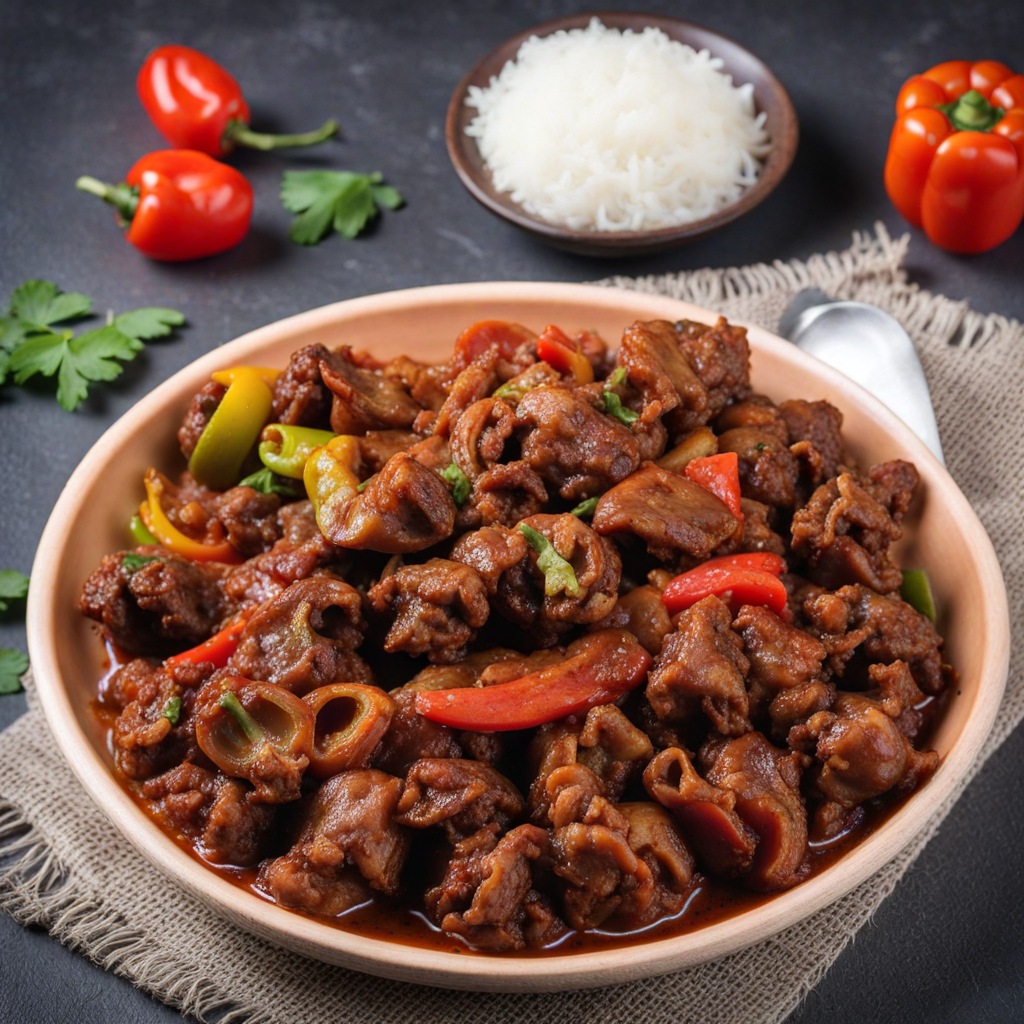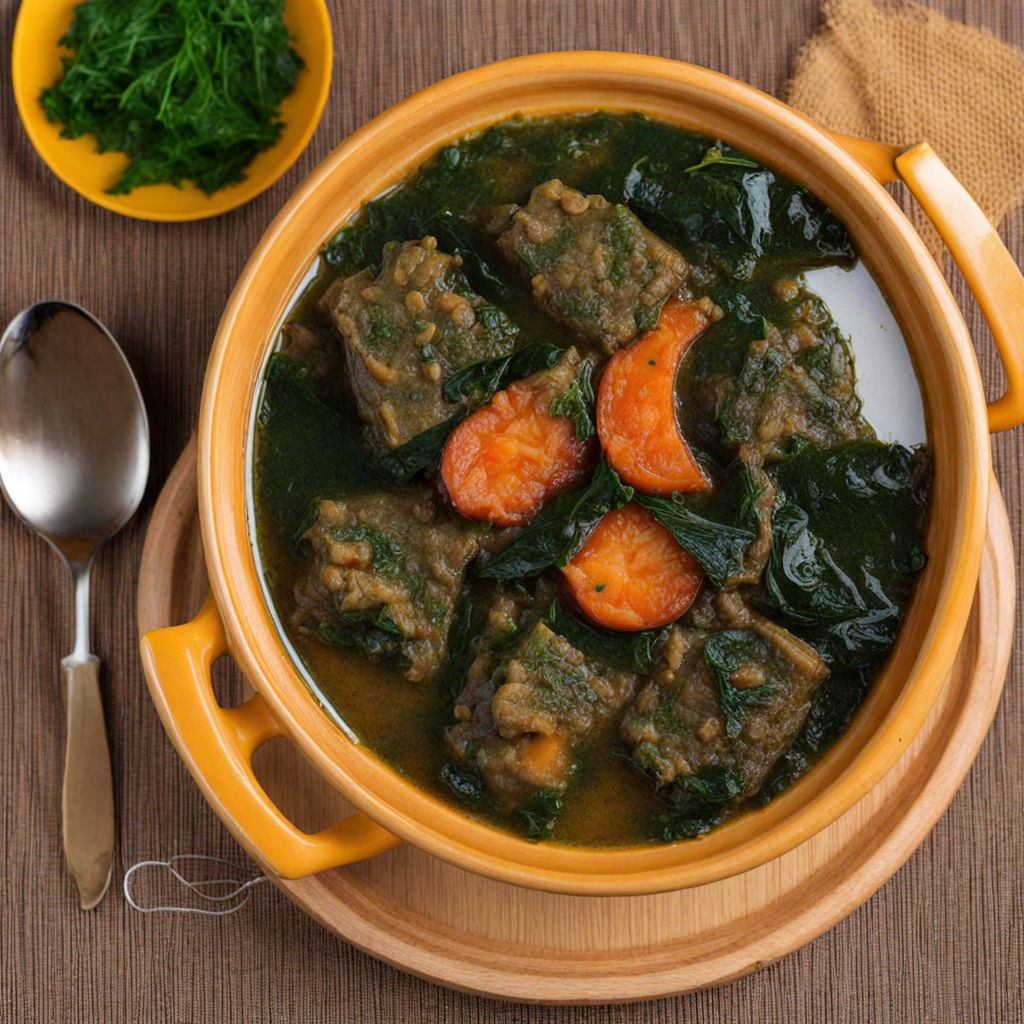Peppered Gizzard
Peppered Gizzard, a popular dish in Nigeria, is an explosion of flavors and textures that showcases the vibrant culinary culture of the country. The dish primarily features gizzards, which are the muscular stomachs of birds, particularly chickens. These gizzards are cleaned, boiled, and then marinated in a rich blend of spices that typically includes a variety of peppers, onions, garlic, and ginger. The marination process not only tenderizes the gizzards but also infuses them with a robust flavor that is both spicy and aromatic, making each bite a delightful experience for the palate. Once marinated, the gizzards are often grilled or fried, resulting in a crispy exterior that contrasts beautifully with the tender, juicy inside. The grilling or frying process allows the spices to caramelize, enhancing the overall flavor profile of the dish. Often served with a side of spicy dipping sauce, Pepper Gizzard is typically enjoyed as a snack or appetizer, making it a popular choice at social gatherings, parties, and street food stalls across Nigeria. In addition to its taste, Pepper Gizzard also offers a unique texture that is both chewy and succulent. The dish is often accompanied by sides such as fried plantains or a fresh salad to balance the heat of the peppers. Its bold flavors and satisfying crunch make it an irresistible option for those looking to explore the rich culinary landscape of Nigeria. Whether enjoyed on its own or paired with other traditional dishes, Pepper Gizzard is sure to leave a lasting impression on any food lover eager to discover new tastes.
How It Became This Dish
The History of Peppered Gizzard: A Culinary Treasure of Nigeria #### Origins Peppered gizzard, known as "Gizzard Pepper Soup" or "Peppered Gizzard" in Nigeria, is a beloved dish that showcases the country's rich culinary heritage. The gizzard, a muscular organ found in the digestive tract of birds, particularly chickens and turkeys, has been consumed in various cultures around the world. However, in Nigeria, it has taken on a unique identity, and peppered gizzard has become a staple in local cuisine, particularly among the Yoruba, Igbo, and Hausa ethnic groups. The origins of consuming gizzards can be traced back to traditional agricultural practices when poultry farming was prevalent. As farming communities cultivated their crops, they also kept livestock, which included chickens. Gizzards were often seen as a by-product of poultry, and rather than letting them go to waste, they were incorporated into meals. This practice reflects a deep understanding of resourcefulness and sustainability in food preparation, a fundamental aspect of Nigerian culinary traditions. #### Cultural Significance Peppered gizzard is not just a dish; it embodies the spirit of community and celebration in Nigerian culture. It is often served at festivities, parties, and family gatherings, symbolizing hospitality and abundance. The dish is typically prepared with an array of spices, including Scotch bonnet peppers, onions, and various herbs, making it a flavorful representation of Nigeria's diverse spice palette. The use of hot peppers is particularly significant, as it reflects the country's love for bold flavors and the importance of chili in Nigerian cuisine. In addition to its festive significance, peppered gizzard is often enjoyed as a street food delicacy. Vendors across Nigeria serve it as a quick snack or a side dish, making it accessible to people from all walks of life. This availability contributes to its status as a comfort food, often evoking nostalgia for childhood and family gatherings. The dish's versatility allows it to be paired with various accompaniments, including rice, yam, or plantains, further embedding it within the fabric of Nigerian dining customs. #### Development Over Time As Nigeria has evolved, so too has the preparation and presentation of peppered gizzard. Traditional methods of cooking have been enriched by influences from various regions and communities. In urban areas, particularly cities like Lagos and Abuja, peppered gizzard has undergone a transformation. The dish is now often served in upscale restaurants, presented with a modern twist, yet retaining its authentic flavors. This evolution highlights the dynamic nature of Nigerian cuisine, where traditional dishes adapt to contemporary dining experiences. The rise of the Nigerian diaspora has also played a crucial role in the global recognition of peppered gizzard. As Nigerians migrated to various parts of the world, they brought their culinary traditions with them. Restaurants specializing in Nigerian cuisine began to appear in cities with significant Nigerian populations, introducing dishes like peppered gizzard to a broader audience. The dish has since garnered appreciation beyond its local roots, becoming a point of interest for food enthusiasts eager to explore the flavors of West Africa. In recent years, social media has further fueled the popularity of peppered gizzard. Food bloggers and influencers showcase the dish, sharing recipes, cooking tips, and personal anecdotes associated with its preparation. This digital platform has created a community of food lovers who celebrate Nigerian cuisine, leading to an increased demand for traditional dishes like peppered gizzard both at home and abroad. #### Preparation and Ingredients The preparation of peppered gizzard is an art that combines traditional techniques with personal flair. The gizzards are cleaned and boiled until tender, often seasoned with salt and spices during the cooking process. After boiling, they are typically sautéed with onions, garlic, ginger, and the star ingredient—Scotch bonnet peppers. This fiery pepper not only adds heat but also imparts a distinctive flavor that is synonymous with Nigerian dishes. Herbs such as thyme and curry powder are often included to enhance the aromatic profile of the dish. The final touch usually involves a drizzle of palm oil or vegetable oil, which adds a rich, glossy finish. Some variations may include additional ingredients like bell peppers or carrots to introduce color and texture. #### Conclusion Peppered gizzard is more than just a dish; it is a testament to Nigeria's rich culinary history and cultural identity. From its origins as a humble by-product of poultry farming to its status as a beloved street food and upscale restaurant offering, peppered gizzard has journeyed through time, adapting to changing tastes while remaining true to its roots. The dish encapsulates the essence of Nigerian hospitality, community, and resourcefulness, making it a cherished part of family gatherings and celebrations. As Nigeria continues to share its culinary treasures with the world, peppered gizzard stands out as a flavorful ambassador of Nigerian cuisine, inviting everyone to experience its unique taste and the stories that come with it. Whether enjoyed at a bustling street vendor, a family feast, or a fine dining experience, peppered gizzard remains a delicious symbol of Nigeria's vibrant food culture.
You may like
Discover local flavors from Nigeria







